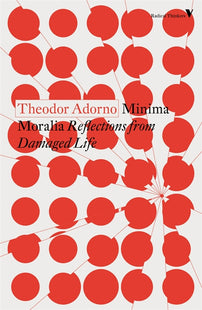There is nothing innocuous left by Theodor Adorno
All collaboration, all the human worth of social mixing and participation, merely masks a tacit acceptance of inhumanity. It is the sufferings of men that should be shared: the smallest step towards their pleasures is one towards the hardening of their pains.

As part of our September student reading, we're publishing an excerpt from Theodor Adorno's beloved collection Minima Moralia: Reflections from Damaged Life every day until the end of the month.
All books are 40% off as part of our Student Reading Sale. Ends September 30 at 11:59PM EST. See all our student reading lists here.
How nice of you, Doctor
There is nothing innocuous left. The little pleasures, expressions of life that seemed exempt from the responsibility of thought, not only have an element of defiant silliness, of callous refusal to see, but directly serve their diametrical opposite. Even the blossoming tree lies the moment its bloom is seen without the shadow of terror; even the innocent 'How lovely!' becomes an excuse for an existence outrageously unlovely, and there is no longer beauty or consolation except in the gaze falling on horror, withstanding it, and in unalleviated consciousness of negativity holding fast to the possibility of what is better. Mistrust is called for in face of all spontaneity, impetuosity, all letting oneself go, for it implies pliancy towards the superior might of the existent. The malignant deeper meaning of ease, once confined to the toasts of conviviality, has long since spread to more appealing impulses.
The chance conversation in the train, when, to avoid dispute, one consents to a few statements that one knows ultimately to implicate murder, is already a betrayal; no thought is immune against communication, and to utter it in the wrong place and in wrong agreement is enough to undermine its truth. Every visit to the cinema leaves me, against all my vigilance, stupider and worse. Sociability itself connives at injustice by pretending that in this chill world we can still talk to each other, and the casual, amiable remark contributes to perpetuating silence, in that the concessions made to the interlocutor debase him once more in the person of speaker. The evil principle that was always latent in affability unfurls its full bestiality in the egalitarian spirit. Condescension, and thinking oneself no better, are the same. To adapt to the weakness of the oppressed is to affirm in it the pre-condition of power, and to develop in oneself the coarseness, insensibility and violence needed to exert domination. If, in the latest phase, the condescending gesture has been dropped and only the adaptation remains visible, this perfect screening of power only allows the class-relationship it denies to triumph more implacably. For the intellectual, inviolable isolation is now the only way of showing some measure of solidarity. All collaboration, all the human worth of social mixing and participation, merely masks a tacit acceptance of inhumanity. It is the sufferings of men that should be shared: the smallest step towards their pleasures is one towards the hardening of their pains.
1. Herr Doktor, das ist schon von Euch: humble thanks of an old peasant to Faust for consorting with a popular crowd at Easter (Goethe's Faust, Part One).
